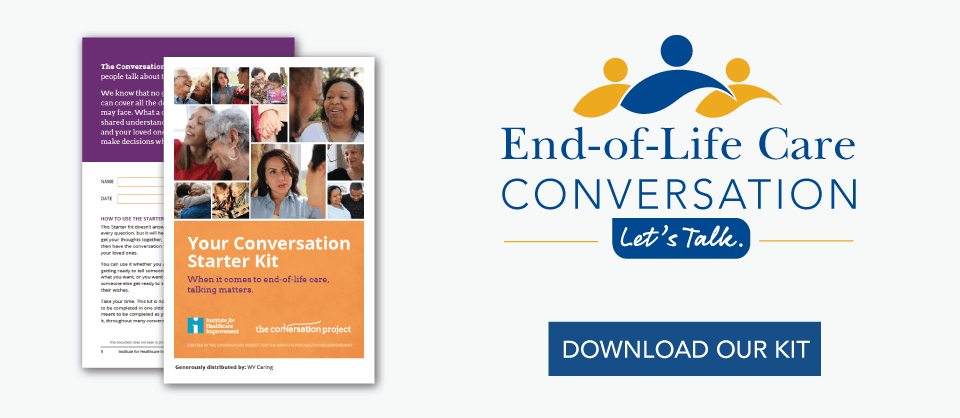At WV Caring, we believe contacting a hospice and palliative care provider for end-of-life services earlier rather than later is important. Starting care earlier can help patients provide the necessary medical care and manage the symptoms, emotional and spiritual needs throughout the life-limiting illness. Families and caregivers receive direct support by providing practical assistance, caregiver education, as well as provide essential understanding of their loved one’s wishes during what may be a stressful time. All of this to help the patient have the best quality of life for as long as possible.
Often, we are asked, “when is it time to contact WV Caring for end-of-life care services?” The simple answer is: any time someone is diagnosed with a serious illness or disease. It’s never too early to look at and understand hospice or palliative care options.
Learn more about the signs that a patient needs hospice or palliative care, what WV Caring can do to help and if you haven’t already–how to start the end-of-life care conversation.
WHEN IS IT TIME TO CONSIDER HOSPICE CARE?
Receiving a diagnosis with a terminal illness, of six months or less, for you or someone is very difficult and overwhelming. At that point, if you’ve exhausted all treatment options, hospice is an option many consider.
However, it is not always obvious that your loved one needs end-of-life care. Aging is something that we are doing every minute of each day. Sometimes it is difficult to notice the slight changes in a loved one’s health; especially if you live with them. However, these changes are important to notice and understand. It’s as simple as noticing that he/she has lost interest in daily activities like cooking, eating or taking care of themselves. Weight loss and several other changes are indicators of a loved one’s decline in their health.
If you aren’t sure your loved one needs hospice, download our guide to learn the seven signs that your loved one needs hospice here.
Hospice is special because it concentrates on comfort care, not cure. Patients who elect hospice must have a prognosis of six months as noted by their physician. It is available to those of any age as long as they meet the criteria or their diagnosis; and, care is provided to patients wherever they call home. It includes: managing medical care, addressing emotional and spiritual needs, support for the family and caregivers and bereavement. It allows patients with terminal illnesses to spend as much time with their family as they can and do the things that matter most.
Many studies have shown the benefits of hospice. In a 2007 study published in the Journal of Pain and Symptom Management, conducted and sponsored by National Hospice and Palliative Care Organization (NHPCO), it was found that hospice may prolong the lives of some terminally ill patients by 29 days verses not having hospice during their final days.
This study, which analyzed the survival of 4,493 patients from a sample of five percent of the entire Medicare beneficiary population for 1998 to 2002 associated with six narrowly defined markers, found that the mean survival period was significantly longer for hospice patients with chronic heart failure (CHF), lung cancer and pancreatic cancer. To read more on this study, click here.
Hospice care at WV Caring assists in the following areas:
- A program coordinated to care for the person with a terminal illness.
- Using a team approach involving the patient, their doctor, a hospice nurse, clinical nursing aide (CNA), social worker, chaplain and volunteers.
- Provide symptom management for physical, emotional and spiritual needs.
- Services available on call 24 hours a day, 7 days a week.
- Bereavement support is provided to the family for 12 months following the death of a loved one.
- Medications
- Durable Medical equipment
- Volunteer support
These are covered under the Medicare Hospice Benefit with no out-of-pocket expenses for the patient. Hospice is also covered by Medicaid and other commercial insurances. WV Caring provides care for those who do not have insurance and no ability to pay for care. Read more about our hospice care services here.
Hear from a caregiver and her mother’s experience with hospice care below.
WHEN IS IT TIME TO CONSIDER PALLIATIVE CARE?
While hospice is for patients with a terminal illness, palliative care is provided to the patient at any time within the diagnosis of a serious illness. It may be time to consider palliative care when the effects of the patient’s advanced illness begin to impact their quality of life and daily activities, despite the best care received by medical professionals.
If you aren’t sure your loved one needs palliative care, download our guide to learn the four signs a loved one needs palliative care here.
At WV Caring, palliative care assists patients in achieving the best possible quality of life by reducing the physical and emotional burden of the advanced illness journey. Our knowledgeable staff will provide patients with a better understanding of their condition and choice of care including symptom management. Read more about our palliative care services here.
END-OF-LIFE CARE CONVERSATION
For anyone who has not started the end-of-life care conversation, the time is now. At WV Caring, we believe that talking about what the patient wants at the end of their life with their loved ones and care team is important. Talking through their wishes can give everyone a shared understanding of what matters most to them, such as: healthcare treatments in the event of a medical crisis and where they would prefer to die.
To learn more about the end-of-life care conversation, click here.
HOW CAN WV CARING HELP WITH END-OF-LIFE CARE?
Late referrals do happen, but it is best to start looking at your options sooner rather than later. At WV Caring, we understand that even if a patient has the same symptoms as someone else, every patient’s treatment will be different. This is why our knowledgeable staff is able to talk to everyone, even if they aren’t ready to receive hospice or palliative care.
If your loved one is questioning whether it’s the right time to look at end-of-life care services, let us know. We can answer any questions you or they may have. Our number is 1-866-656-9790.

